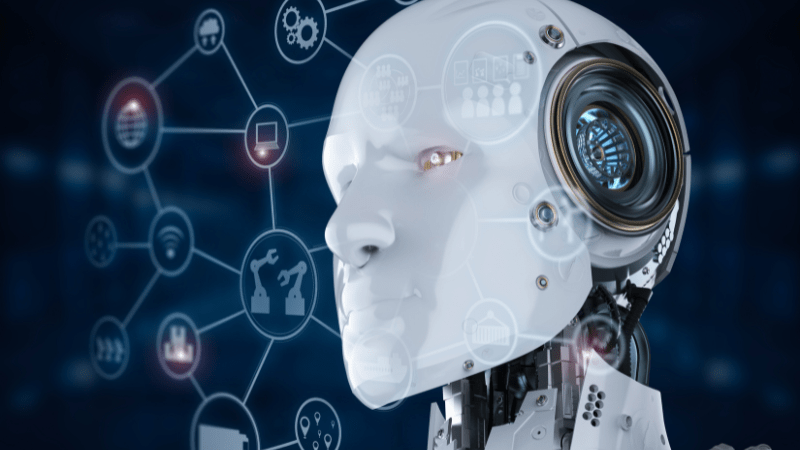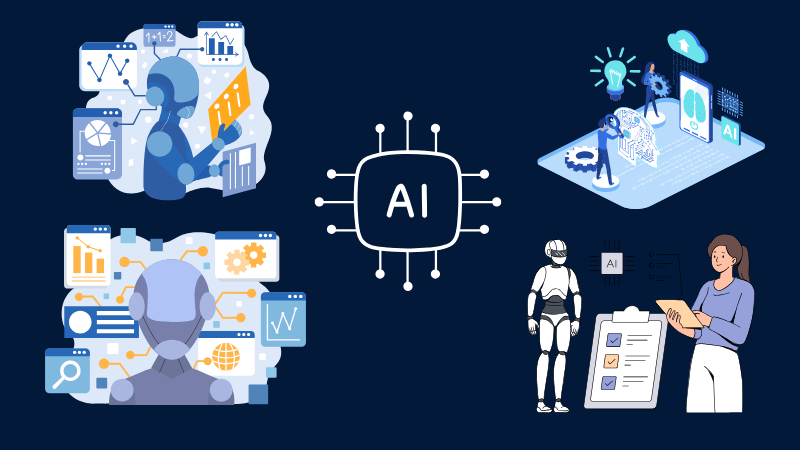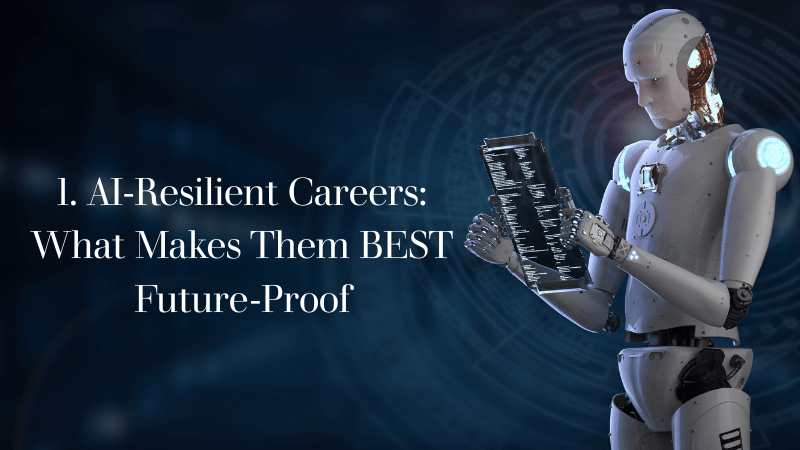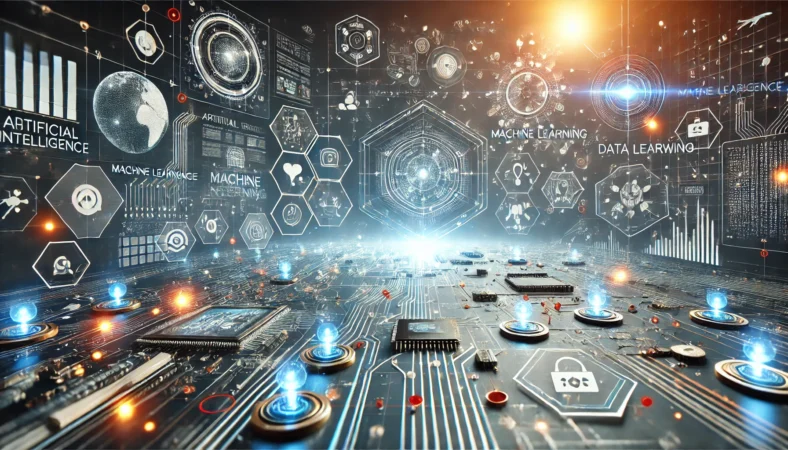Introduction
Artificial Intelligence (AI) is transforming the global job market at a speed no one imagined a decade ago. From manufacturing to marketing, and from education to healthcare, AI is automating tasks that were once handled only by humans. While this has created excitement, it has also created fear—fear of job loss. Many reports suggest that millions of jobs could disappear in the next decade due to automation and AI-driven systems.
But not all careers are at risk. Some professions are more resilient to AI because they rely on skills and qualities that machines cannot easily replicate. These are known as AI-resilient careers. Understanding what makes these careers future-proof can help students, professionals, and policymakers prepare for a future where AI and humans work side by side.
AI-Resilient Careers: What Makes The Best future-proof on youtube
What Are AI-Resilient Careers?
AI-resilient careers are jobs that are less likely to be replaced by machines. They typically involve qualities like creativity, empathy, ethical judgment, and complex problem-solving. While AI is excellent at analyzing data and performing repetitive tasks, it struggles with human emotions, imagination, cultural understanding, and moral decision-making. Careers that heavily depend on these human qualities are considered safer in the age of automation.

Why Some Careers Are More Future-Proof
There are several reasons why some careers are AI-resilient:
- Human Interaction: Jobs that require face-to-face human relationships cannot be easily replaced. For example, teachers, counselors, and doctors rely on trust and empathy.
- Creativity and Innovation: AI can generate content but lacks originality. Artists, designers, and entrepreneurs thrive on imagination and innovation.
- Ethics and Values: Many decisions in law, healthcare, and management require moral judgment, something AI cannot fully grasp.
- Adaptability: Human beings can adapt to new situations, cultures, and trends. AI follows programmed logic and struggles outside its data set.
- Leadership and Strategy: Leading people requires emotional intelligence, vision, and motivation. Machines cannot inspire humans the way true leaders do.
Top AI-Resilient Careers
1. Healthcare Professionals
Doctors, nurses, therapists, and caregivers are highly AI-resilient. While AI can assist in diagnosing diseases or analyzing scans, the empathy, trust, and emotional support provided by healthcare workers cannot be replaced. Patients value the human touch in medical care, which machines can never replicate.
2. Educators and Trainers
Teaching is more than just delivering content; it is about inspiring, motivating, and understanding students. AI can provide knowledge, but it cannot replace the role of a teacher who adjusts to individual learning styles, provides moral support, and builds character.
3. Creative Professionals
Writers, filmmakers, musicians, and designers thrive on creativity. While AI tools can generate art or text, they lack originality and emotional depth. The human imagination, cultural context, and storytelling ability are what make creative work unique and irreplaceable.
4. Entrepreneurs and Innovators
Entrepreneurship requires vision, risk-taking, and the ability to identify opportunities. AI can analyze data and suggest trends, but only humans can imagine entirely new products or business models. Innovators think beyond what already exists.
5. Skilled Trades
Electricians, plumbers, mechanics, and construction workers rely on practical problem-solving in unpredictable environments. AI and robots may assist in factories, but real-world, hands-on trade skills are hard to automate completely.
6. Lawyers and Legal Advisors
While AI can search through legal documents and analyze cases, human lawyers interpret laws, understand ethics, and argue in courts. Legal practice involves persuasion, moral reasoning, and cultural awareness—qualities that machines lack.
7. Managers and Leaders
Leadership involves guiding teams, inspiring people, and making strategic decisions under uncertainty. AI can provide data-driven insights, but the ability to motivate and manage human emotions is a uniquely human strength.
8. Mental Health Professionals
Psychologists, counselors, and therapists help people through empathy, listening, and emotional understanding. AI chatbots can provide basic support, but they cannot truly understand human pain, trauma, or emotions in the way trained professionals can.
9. Scientists and Researchers
AI helps researchers analyze data, but new scientific theories require imagination and intellectual curiosity. Many breakthroughs in history came from human intuition, which AI cannot replicate.
10. Human-Centered Service Jobs
Hospitality, tourism, and customer service jobs that require warmth, cultural sensitivity, and personal interaction are less likely to be automated. AI may assist, but human connection remains central.
What Makes These Careers BEST Future-Proof?
To summarize, the careers listed above are future-proof because they rely on:
- B – Brainpower Beyond Data: Human critical thinking and problem-solving.
- E – Empathy: The ability to connect emotionally with others.
- S – Social Skills: Communication, leadership, and collaboration.
- T – Talent and Creativity: Unique human imagination and innovation.
Together, these qualities—BEST—make certain careers highly resilient to AI disruption.
Preparing for an AI-Driven Future
Even in AI-resilient fields, workers must adapt. The future will not be “humans vs AI” but rather “humans with AI.” Those who learn to use AI tools effectively will have a huge advantage. For example:
- Teachers using AI to personalize learning.
- Doctors using AI to detect diseases faster.
- Entrepreneurs using AI to analyze markets.
- Artists using AI to enhance their creative process.
Thus, the key is not to fear AI but to embrace it as a partner.

Conclusion
Artificial Intelligence is reshaping the job market, and many careers will face disruption. However, AI-resilient careers—those built on human empathy, creativity, ethics, and leadership—will remain strong. By focusing on qualities that machines cannot replicate, individuals can make their careers BEST future-proof.
In the end, the future belongs to those who combine the power of technology with the depth of humanity. AI may be intelligent, but only humans can truly be wise.
______________________
YOU MAY ALSO LIKE:


